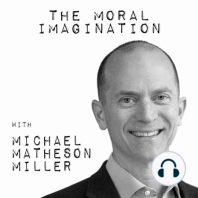84 min listen

Ep. 49 Flagg Taylor, Ph.D The Parallel Polis
Ep. 49 Flagg Taylor, Ph.D The Parallel Polis
ratings:
Length:
104 minutes
Released:
Dec 22, 2022
Format:
Podcast episode
Description
In this episode I speak with Flagg Taylor about the life and writing of Vaclav Benda, and his idea of the parallel polis, decentralization, and creating space in society for culture, the family, charity, education, and human flourishing. Though he was writing under communist regimes, Benda’s writings are very relevant today in light democratic pressures to conformity, de-platforming, and especially as a new ontology of the person is being written into law — and dignity is used as weapon against religious and cultural liberty. Benda’s idea of the parallel polis was not a siege mentality, nor so much a reform existing structures that had ossified or were corrupted, but a call to build new, innovative, and better structures and social institutions that would activate people’s participation in civil, cultural, and commercial life, and give people a sense of purpose and agency. Examples today include decentralized technologies or classical education - which is not running away, but creating better alternatives to mediocre state run schools. We discuss Benda’s ideas in the context of Czech communism and also in contemporary America, especially the overlap with Alexis de Tocqueville’s warnings about individualism, centralization, and soft-despotism. We examine his engagement with various thinkers including Roger Scruton and J.R.R. Tolkien, and talk about contemporary movements towards decentralization including The Network State by Balaji Srinivasan and its relation to the idea of a parallel polis. We discuss the need for social and commercial alternatives built on a rich understanding of the human person and the family including healthcare, mutual aid societies, banking, payment, insurance and more. Benda’s idea of the parallel polis demonstrates that the solution to totalitarianism and centralization is not more centralization or another totalitarianism, but de-centralization and humanization. We discuss a number of Benda essays including: The Parallel Polis, The Meaning Context Legacy of the Parallel Polis, The Family and Totalitarianism, A Critique of the Idea of a Christian State, and his personal reflections that illustrate the constant social pressure of living under communist totalitarianism. Themes and Topics include Albert Hirshman: Exit, Voice, and Loyalty Peter Berger on Plausibility Structures Vaclav Havel: Power of the Powerless Greengrocers of the World Unite! Aristotle’s Moral and Intellectual Virtues Vaclav Havel Living in Truth Benda focus on resisting the lies of totalitarianism by inhabiting a social spaces and plausibility structures that make living in truth possible. MMM Lecture How to Build a Moral Imagination — new and better ways of live are actually plausible Provide space for dissidents and their children who were excluded by the official social spaces Balaji - The Network State - Network Union - Network Archipelago — cloud first, then land Catholic Variation: Land - Cloud -Land New Ontology of the Person Totalitarian redefinition of biology and sociological reality Dignity as a weapon against religious liberty Testing the Limits in Communism vs Testing the Limits in Modern Democracy De-platforming Cancel Culture Underground Seminars led by Roger Scruton Roger Scruton and Jan Hus Foundation Ortega y Gassett: The Spoiled Child of History Second Culture Charter 77 Essay at Foreign Policy Magazine VONS Committee for the Defense of the Unjustly Prosecuted Religious practice in Slovakia vs Czech Republic vs. Poland Church Persecution by Communists in the 40s - 70s Communist infiltration of Church and official Church collaboration with Communists 70s and 80s. Critique of the Christian idea of a state How politicalization of religion can lead to unbelief Benda compared to contemporary Catholic integralists / post liberal thinkers Pappin, Ahmari, Pecknold on Cultural Christianity and Politics MMM commentary to this essay: Political Catholicism, Liberalism and the Myth of Neutrality Secularism is
Released:
Dec 22, 2022
Format:
Podcast episode
Titles in the series (57)
Ep. 14: The Triumph of the Yuppie — Carlo Lancellotti on Augusto del Noce, Secularization, Revolution, and the Crisis of Modernity by The Moral Imagination